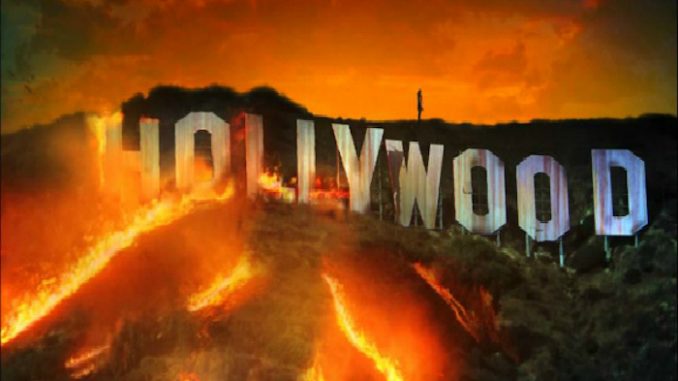
Hollywood is on the brink of collapse as audience numbers dip to a staggering 22-year-low, according to ticket sales data.
With the endless trashing of President Trump by Hollywood’s elite and the numerous pedophile and rape scandals continuing to unfold, the American people are turning away from Hollywood-produced films in their droves.

BYPASS THE CENSORS
Sign up to get unfiltered news delivered straight to your inbox.
You can unsubscribe any time. By subscribing you agree to our Terms of Use
Latest Video
The number of tickets sold in 2017 dropped 4% to 1.26 billion – the lowest level since 1995, according to conservative estimates from studio executives.
https://youtu.be/CPHpKO2C-Sw
Latimes.com reports: The falloff in ticket sales can mostly be explained by a handful of movies that flopped, especially during the dreary summer season that posted the worst results in more than two decades. Even such massive hits as “Wonder Woman,” “Thor: Ragnarok” and “It” couldn’t make up for a lackluster summer lineup populated by rickety franchises (“Alien: Covenant”) and poorly reviewed retreads (“The Mummy”).
However, the long-term decline in attendance reflects systemic challenges facing the industry. Audiences are spending less time going to the movies and are consuming more entertainment on small screens and through streaming services such as Netflix and Amazon that are spending billions on original video content.
At the same time, while higher ticket prices have helped to offset attendance declines, they have made consumers pickier about what movies they’re willing to go see. And those increasingly discerning consumers turn to social media and Rotten Tomatoes to decide what’s worth their time and money.
“You cannot pull a fast one on the audience,” said Greg Foster, chief executive of Imax Entertainment. “The tools that are available for consumers to decide how and where to spend entertainment dollars are so vast. Consumers know what works and what doesn’t long before the product becomes available.”
Challenges at the box office are helping to fuel a wave of media consolidation. Walt Disney Co. this month announced a blockbuster deal to buy entertainment assets from Rupert Murdoch’s 21st Century Fox for $52.4 billion.
Murdoch’s surprise decision to sell the bulk of his media empire was at least partly motivated by concerns about the future of the movie business in a world dominated by streaming, analysts said.
Cinema chains also are bulking up to better compete. Regal Entertainment Group, the nation’s second-largest theater owner, last month agreed to sell to British theater company Cineworld for $3.6 billion.
For studios, the box office has become a land of princes and paupers, with a handful of movies and a couple studios increasingly dominating the business. As of Dec. 17, Walt Disney Co. and Warner Bros. accounted for 40% of domestic market share. In 2012, the top two studios (Sony and Warner Bros.) only took up 30% of the industry total.
Of the 165 wide-release movies this year, the top 20 claimed 51% of ticket sales in 2017, representing a 2% increase from last year, according to estimates from distributors. Five years ago, the 20 biggest movies accounted for about 40% of annual grosses.
“It’s a really binary business between the haves and the have-nots,” said Jeff Goldstein, head of domestic distribution for Warner Bros.
Nowhere was that trend clearer than last weekend, when the animated Fox movie “Ferdinand” opened against Disney’s “The Last Jedi.” The $111-million kids’ film about a fighting-averse bull opened with a pitiful $13 million, due to a lack of audience interest in the story and competition from Pixar’s hit computer-animated movie “Coco.” By contrast, the new “Star Wars” opened with $220 million — nearly 17 times “Ferdinand’s” debut.

Hollywood’s lack of fresh ideas also dampened ticket sales. Consumers clearly rejected aging franchises and retreads of old concepts and characters, especially during the summer months. Few people wanted to see Paramount’s R-rated “Baywatch” revival or Universal’s reboot of “The Mummy,” which was supposed to kick-start a series of monster movies. Ditto for the fifth “Transformers” movie.
“The films that underperformed were the fifth or eighth in the franchise,” said Eric Wold, an entertainment and media analyst with B. Riley FBR Inc. “Those franchises were already on the decline, so you can’t expect people to go run to them.”


